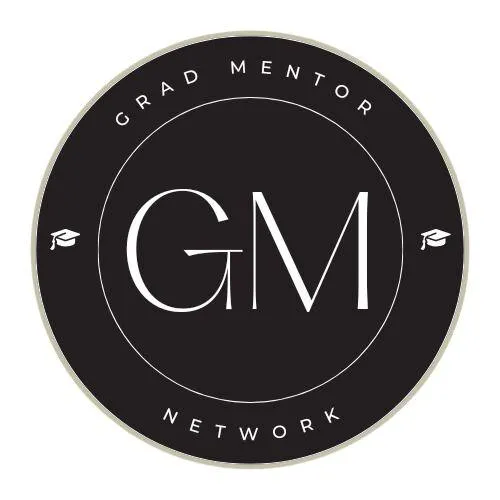

Welcome to the Grad Mentor Network
Unlock Your Academic Potential with Our Exclusive Membership Plans

WHO WE ARE
Unlock Success with Tailored Academic Support
At Grad Mentor Network, led by Dr. Robinson and showcased on renowned platforms such as "Dissertation in 90 Days" and "Club 3E," we offer a comprehensive support system for graduate and doctoral students. Leveraging the expertise of WritersER, which helps master's and PhD candidates achieve approval in six months or less, and our Grad Bootcamps, designed to help students navigate the complexities of academia through bootcamps, our programs are meticulously crafted to support you through every stage of your academic journey. Subscribe today and unlock access to an extensive array of resources, expert guidance, and a supportive community tailored specifically to your academic needs.


Mentoring
Personalized guidance from experts, including Dr. Robinson, to help members navigate their academic journey effectively.

Resources
Access to a comprehensive library of study guides, templates, and specialized training materials tailored for graduate and doctoral studies.

Community
Connection to a private online network where members can interact, share experiences, and support each other through their academic challenges.
Tier 1:
Essential Support - $19/month
Podcasts
Tune in to five weekly podcast episodes packed with strategies for dissertation success, effective time management, research methodologies, and tackling graduate challenges.
Community Access
Join our exclusive online community to connect with peers, share your journey, and find support from fellow students.
Newsletters
Receive five weekly newsletters filled with actionable advice, insightful tips, and motivational content designed specifically for graduate and doctoral students.
Live Q&A Sessions
Engage in our monthly live Q&A sessions with Dr. Robinson and other field experts, designed to answer your burning questions and provide personalized guidance.
Tier 2:
Advanced Support - $49/month
(Includes Tier 1)
GradCoach.io App Access Coming Soon
Get tailored training covering everything from proposal writing to thesis defense, exclusively designed for PhD and Master's students.
Weekly Live Training
Participate in live interactive sessions that delve into essential aspects of the academic journey, offering real-time feedback and personalized advice.
Resource Library
Study guides, templates, and essential research tools sent to your email.
Exclusive Discounts
Enjoy special discounts on Grad Mentor Network-branded merchandise and academic tools.
Digital Calendar
Start each month with a new, beautifully designed digital calendar wallpaper.
Tier 3:
Premium Support - $79/month
(Includes Tiers 1 and 2)
Dissertation Tools
Access downloadable exercises and worksheets tailored for each phase of your dissertation, keeping you organized and on track.
Monthly Digital Product
Receive a new digital product each month, such as e-books, specialized training videos, or unique templates.
Monthly Mastermind Sessions
Join small group mastermind sessions that focus on specific academic challenges, offering tailored solutions and peer support
One-on-One Mentoring
Benefit from two personal mentoring sessions per month, providing you with expert guidance tailored to your individual needs.
Priority Support and Exclusive Content
Enjoy priority email support and behind-the-scenes looks at training sessions and upcoming projects.
Personalized Editing Support (10 Pages per month)
Receive tailored editing assistance for up to 10 pages each month, ensuring your content is polished and professionally refined to meet your specific needs.
Tier 4:
Exclusive Support - $99/month
(Includes Tiers 1, 2, and 3)
Recognition and Thanks
Be acknowledged by name in all new podcast episodes and video descriptions.
Specialized Webinars
Gain access to exclusive webinars discussing advanced topics like grant writing and career planning in academia.
Personalized Feedback
Receive detailed feedback on your dissertation chapters or research papers from Dr. Robinson or a senior mentor.
Networking Opportunities
Get invitations to virtual networking events with alumni and professionals across various academic fields.
Unique Merchandise
Claim exclusive Grad Mentor Network merchandise not available to other tiers.
Personalized Editing Support (15 Pages per month)
Get customized editing support for up to 15 pages monthly, enhancing clarity, style, and accuracy according to your unique requirements.
Tier 5:
Ultimate Support - $109/month
(Includes Tiers 1, 2, 3, and 4)
Social Media Recognition
Receive a monthly shoutout by name on our social media platforms and YouTube community tab.
On-Screen Credits
Enjoy on-screen recognition as a co-sponsor in every episode of our podcasts and training videos.
VIP Access
Get exclusive tickets to VIP events and workshops, designed to elevate your academic and professional connections.
Advanced Mastermind Sessions
Engage in weekly advanced mastermind sessions with high-achieving peers and field experts.
Exclusive Content Feed
Dive into an exclusive content feed filled with behind-the-scenes updates, additional resources, and more.
Free Books
Enjoy a free book every month from the Doctoral Chronicles Series or authored by Dr. Robinson, up to 12 books a year.
Resources

Coaching and Editing Support for your Dissertation

Books, Newsletters and Podcasts

Bootcamps

TAKING A FRESH LOOK
Membership Tiers
Tier 1
1 Month Essential Support
$19
Weekly Podcasts
Motivational Newsletters
Private Community
Monthly Q&A
Tier 2
1 Month Advanced Support
$49
Tier 1
App Access
Live Training
Resource Library
Merchandise Discounts
Tier 3
1 Month Premium Support
$79
Tier 1 & 2
Dissertation Tools
Digital Products
Bi-Weekly Mastermind
One-on-One Mentoring
Tier 4
1 Month Exclusive Support
$99
Tier 1, 2 & 3
Name Recognition
Specialized Webinars
Personalized Feedback
Networking Events
Tier 5
1 Month Ultimate Support
$109
Tier 1, 2, 3 & 4
Social Media Shoutout
On-Screen Credits
VIP Event Access
Advanced Mastermind
Resource Milestones
Expansive Collection of Guides, Templates, and Training Materials

5,000+
Downloads Achieved

1,200+
Resources Created

Recent Blogs

Breaking Down the Dissertation Chapters: A Guide for Graduate Students
Breaking Down the Dissertation Chapters: A Guide for Graduate Students
Introduction
Writing a dissertation is a significant academic milestone, and understanding its structure is key to creating a strong and cohesive document. Each chapter serves a specific purpose and contributes to the overall argument and analysis of your research. This guide will help you navigate the essential components of a dissertation, providing insights and tips for tackling each chapter with confidence.

1. Introduction Chapter: Setting the Stage
The introduction is the foundation of your dissertation. It presents the research problem, outlines the study’s significance, and provides a roadmap for what’s to come.
Key Elements of the Introduction:
Background Information: Provide context and explain why your topic is important.
Research Problem: Clearly articulate the issue your study addresses.
Objectives and Research Questions: Define what you aim to achieve and the questions guiding your research.
Structure of the Dissertation: Briefly describe the contents of each chapter.
Tip: Write the introduction after drafting other chapters to ensure alignment with the entire dissertation.
2. Literature Review Chapter: Building Context
The literature review situates your research within the existing body of knowledge. It demonstrates your understanding of the field and highlights gaps your study will address.
Key Elements of the Literature Review:
Identify Major Themes: Group studies by recurring themes or perspectives.
Critically Analyze Studies: Evaluate strengths, weaknesses, and methodologies.
Highlight Gaps: Explain how your research will contribute to the field by addressing unanswered questions.
Tip: Use a reference management tool like Zotero or EndNote to keep track of sources.
3. Methodology Chapter: Explaining Your Approach
The methodology chapter outlines the methods and techniques you used to conduct your research. This section establishes the validity and reliability of your study.
Key Elements of the Methodology:
Research Design: Specify whether your study uses qualitative, quantitative, or mixed methods.
Data Collection: Detail how you collected data, such as through surveys, interviews, or experiments.
Data Analysis: Explain the tools or techniques used to analyze your data.
Ethical Considerations: Address how you ensured participant confidentiality and consent.
Tip: Be detailed but concise. Another researcher should be able to replicate your study based on your methodology.
4. Results Chapter: Presenting Your Findings
In the results chapter, you present the outcomes of your research without interpreting them. This chapter is data-driven and focuses on factual reporting.
Key Elements of the Methodology:
Present Data Clearly: Use tables, graphs, or charts to organize findings.
Stick to the Facts: Avoid discussing implications or interpretations here.
Organize by Research Questions: Link results back to your research objectives.
Tip: Label visuals clearly and provide descriptive captions for easy comprehension.
5. Discussion Chapter: Interpreting the Results
The discussion chapter is where you analyze and interpret your findings. Connect your results to your research questions and the existing literature.
Key Elements of the Methodology:
Analyze Results: Explain what your findings mean and how they answer your research questions.
Compare with Literature: Discuss how your results align with or differ from previous studies.
Address Limitations: Acknowledge any challenges or constraints in your study.
Suggest Implications: Highlight the practical or theoretical significance of your findings.
Tip: Ensure your discussion provides a balanced interpretation of results, considering both positive and negative outcomes.
6. Conclusion Chapter: Wrapping It All Up
The conclusion ties everything together, summarizing your key findings and their significance. It also offers recommendations for future research.
Key Elements of the Methodology:
Restate Objectives: Summarize how your study addressed its goals.
Highlight Contributions: Emphasize the value of your research.
Offer Recommendations: Suggest areas for further exploration.
Tip: Keep this section concise and focused on the big picture of your research contributions.
Conclusion: Building a Cohesive Dissertation
Understanding the purpose of each dissertation chapter allows you to approach the writing process strategically. By breaking down the chapters into manageable components, you can ensure that each section builds upon the other, creating a cohesive and impactful dissertation.
Need guidance with your dissertation chapters? WritersER offers personalized coaching to help you navigate every stage of your dissertation. Click here to get started!
Begin Your Journey Today!
Embark on a transformative academic journey with Grad Mentor Network. Choose the membership tier that best suits your needs and become part of a network dedicated to your success. Subscribe now and take the first step towards unlocking your potential in the academic world.
